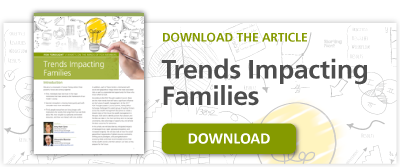7 Ideas for Building Trust

This may not come as a surprise, but individuals have lost trust in the major institutions that have served as the framework of our modern society. Businesses, NGOs, government, and the media have all suffered a loss of trust in recent years for a variety of reasons.
One of our great fears about a world where trust is imploding across the board is that families will be driven to turn away from their external advisors and become more self-directed or insular, making them vulnerable to traps and jeopardizing their success. On the other hand, in times of great vulnerability and distrust, the loyalty of strong inner circle partners often becomes more valued. Those advisors who persevere with the family through significant transitions have been known to be among the most successful at forging trusted relationships that stand the test of time.
We have already seen evidence that the value of belonging to a trusted community of peers is on the rise. The decision made by the FOX Direct Investing Network, a community of avid investors, to explore direct investment opportunities with their liked-minded peers rather than other traditional financial intermediaries, is a prime example.
1. Share What You Stand For—Your Vision
Telling the public “where you come from” by consistently articulating your family story fosters trust, especially for business-owning families.
2. Revisit Your Operating and Decision-Making Model
Trust is supported when there is a strong, reliable decision-making process. A set of parameters that defines a family decision-making model will engender greater family harmony and avoid what can become irreparable family conflict.
3. Trust but Verify Your Advisor Ecosystem
Individuals give up a degree of personal control and decision-making power when working together with an advisor. For this collaborative approach to work, the individuals have to trust the advisors working for the group. Performing due diligence on those advisors fosters confidence and trust and is essential in order to maintain a strong, supportive system.
4. Identify and Recommit to Trusted Communities
The most valuable communities provide not only networking but opportunities for education and learning for those navigating similar life journeys and confronting similar issues.
5. Redefine Personal Touch and Connection
Since authenticity plays such a large part in establishing an emotional connection, figure out what that means to you, your office, and your family enterprise. Be open to using modern communication processes and vehicles to facilitate those connections. At the same time, keep in mind that even digital natives value personal touch and want to engage in person too.
6. Expect Simplicity, Transparency, and Explanations
Better information supports better decision-making and helps families of wealth to feel more secure and confident. Demystifying technology goes hand-in-hand with supporting transparency efforts in eliminating and disclosing conflicts of interest. Don’t be reluctant to ask for greater levels of clarity or explanation. Look for applications where simplification can help you better comprehend pros and cons.
7. Build Understanding & Engagement through Education
Owners and their family office executives seek content that helps support awareness and responsibility around matters of wealth ownership for the rising generation. The confidence that results from these kinds of educational opportunities not only builds trust but also builds greater life perspective and family engagement.
Download my complete article for more on “Trends Impacting Families.”

~~~
According to the FOX Thought Leaders Council, trust is one of the main trends that will have a significant influence on the future of wealth management. At the 2017 FOX Thought Leaders Council Summit, Family Office Exchange challenged this select group of leading thinkers across key wealth management disciplines to create a shared vision of the future for wealth management in the year 2030 and to identify actions that advisors and families can take in the short and long term to manage uncertainty, take advantage of opportunity, and achieve the best outcomes for tomorrow. In upcoming posts, we’ll explore additional trends identified by the Council that stand to shape the future our industry.